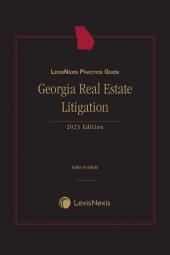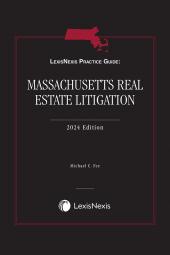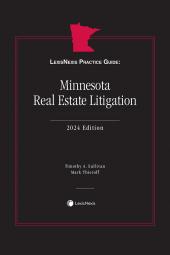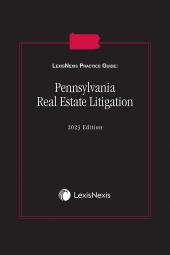LexisNexis Practice Guide: Georgia Real Estate Litigation
Select a format
 International Order Inquiry
International Order Inquiry
Select subscription type
Terms & conditions
Subscribers receive the product(s) listed on the Order Form and any Updates made available during the annual subscription period. Shipping and handling fees are not included in the annual price.
Subscribers are advised of the number of Updates that were made to the particular publication the prior year. The number of Updates may vary due to developments in the law and other publishing issues, but subscribers may use this as a rough estimate of future shipments. Subscribers may call Customer Support at 800-833-9844 for additional information.
Subscribers may cancel this subscription by: calling Customer Support at 800-833-9844; emailing customer.support@lexisnexis.com; or returning the invoice marked "CANCEL".
If subscribers cancel within 30 days after the product is ordered or received and return the product at their expense, then they will receive a full credit of the price for the annual subscription.
If subscribers cancel between 31 and 60 days after the invoice date and return the product at their expense, then they will receive a 5/6th credit of the price for the annual subscription. No credit will be given for cancellations more than 60 days after the invoice date. To receive any credit, subscriber must return all product(s) shipped during the year at their expense within the applicable cancellation period listed above.
The total price includes the product(s) listed in the Order Form and any Updates for a limited period (minimum period of 30 days) after the order is placed ("Order Window"). Shipping and handling fees are not included in the grand total price.
All shipments may be returned, at subscribers' expense, for full credit of the Price within 30 days of receipt.
Shipments may not be returned, and no credits will be issued, more than 30 days after receipt.
After the Order Window, subscribers will receive notice of Updates along with the then-current grand total price and order process as Updates become available. Subscribers will only be shipped those Updates they specifically request.
Product description
View a sample of this title using the ReadNow feature
Find answers quickly in this concise one-volume practical guide, and avoid wasting time. LexisNexis Practice Guide: Georgia Real Estate Litigation provides an easily navigated —and understood—road map to the most prevalent real estate litigation topics that an attorney may encounter. Available in convenient formats you can use in court as well as at your desk: an easily carried soft-bound print volume, an eBook, and on the Internet as part of Lexis+®. Whether you are a seasoned practitioner, or simply need to be refreshed on a particular topic, this guide will serve as a daily resource for your real estate litigation practice.
The 2022 edition ISBN is 9781663345776.
eBooks, CDs, downloadable content, and software purchases are noncancelable, nonrefundable and nonreturnable. Click here for more information about LexisNexis eBooks. The eBook versions of this title may feature links to Lexis+® for further legal research options. A valid subscription to Lexis+® is required to access this content.
Table of contents
CHAPTER 1 LAND USE, ZONING, AND REGULATION LITIGATION
§ 1.01 Overview
§ 1.02 Understanding Zoning and Planning Authority in Georgia
§ 1.03 Conducting Initial Zoning Review and Dispute Process at Local Level
§ 1.04 Appealing Initial Land Use Decision in Court
§ 1.05 Understanding Environmental Regulations of Land Use
CHAPTER 2 LITIGATION OVER TRANSFER OF REAL PROPERTY
§ 2.01 Overview
§ 2.02 Bringing Breach of Contract Claims Between Buyer and Seller
§ 2.03 Bringing Fraud and Related Claims Between Buyer and Seller
§ 2.04 Bringing Claims Involving Brokers
CHAPTER 3 RESIDENTIAL LANDLORD-TENANT LITIGATION
§ 3.01 Overview
§ 3.02 Bringing Tenant's Action Against Landlord
§ 3.03 Bringing Eviction and Related Proceedings
§ 3.04 Bringing Action Against Tenant For Property Damage/Waste
§ 3.05 Understanding and Complying With Security Deposit Regulations
§ 3.06 Understanding Housing Discrimination Rules and Cause of Action
CHAPTER 4 COMMERCIAL LANDLORD-TENANT LITIGATION
PART I. PRACTICAL GUIDANCE
§ 4.01 Creation of Landlord-Tenant Relationship
§ 4.02 Agreements Related to Commercial Leases
§ 4.03 Commercial Lease Requirements
§ 4.04 Lease Enforcement
§ 4.05 Lease Clauses
§ 4.06 Implied Covenants
§ 4.07 Defenses to Breach of Lease Actions
§ 4.08 Unlawful Detainer
§ 4.09 Landlord's Statutory Lien
§ 4.10 Americans with Disabilities Act
§ 4.11 Waste
PART II. FORMS
§ 4.12 Unlawful Detainer Forms
CHAPTER 5 ADVERSE POSSESSION, TRESPASS, AND NUISANCE LITIGATION
PART I. PRACTICAL GUIDANCE
§ 5.01 Topical Overviews
§ 5.02 Establishing Adverse Possession/Prescription
§ 5.03 Understanding Statutory Time Limitations and Requirements
§ 5.04 Asserting and Defeating Adverse Possession Claims
§ 5.05 Defeating Adverse Possession
§ 5.06 Understanding Trespass Generally
§ 5.07 Understanding Nuisance Generally
§ 5.08 Comparing Trespass and Nuisance
PART II. FORMS
§ 5.09 Sample Pleadings and Documents
CHAPTER 6 EASMENTS AND PARTITION ACTIONS
PART I . PRACTICAL GUIDANCE
§ 6.01 Topical Overview
§ 6.02 Defining Easements
§ 6.03 Understanding Types and Formation of Easements
§ 6.04 Establishing Scope and Abandonment of Easement
§ 6.05 Understanding Partition Action
§ 6.06 Understanding Tenancy in Common
§ 6.07 Distinguishing Partition Methods
§ 6.08 Initiating and Conducting Partition Procedure
§ 6.09 Understanding Accounting Between Tenants in Common
PART II. FORMS
§ 6.10 Easement Related Forms
§ 6.11 Partition Related Forms
CHAPTER 7 QUIET TITLE AND REMOVAL OF LIENS
PART I. PRACTICAL GUIDANCE
§ 7.01 Overview
§ 7.02 Bringing Conventional Quiet Title Action
§ 7.03 Bringing Quiet Title Action Against The World
§ 7.04 Conducting Special Master Proceedings
§ 7.05 Defending Against Quiet Title Action
§ 7.06 Removing Mechanics Lien
§ 7.07 Removing Other Liens on Real Estate
PART II. FORMS
§ 7.08 Forms
CHAPTER 8 EMINENT DOMAIN AND INVERSE CONDEMNATION
PART I. PRACTICAL GUIDANCE
§ 8.01 Scope
§ 8.02 Eminent Domain Overview
§ 8.03 Understanding State's Exercise of Eminent Domain
§ 8.04 Delegating Power to Condemn
§ 8.05 Understanding Statutory Eminent Domain Procedure Generally
§ 8.06 Distinguishing Partial Taking and Full Taking
§ 8.07 Fulfilling Prerequisites Before Condemnation Petition
§ 8.08 Understanding General Condemnation Principles
§ 8.09 Identifying Four Forms of Condemnation Proceeding
§ 8.10 Initiating Assessor Proceedings
§ 8.11 Initiating Special Master Proceedings
§ 8.12 Initiating Court Proceedings
§ 8.13 Understanding Transportation-Related and Utility Condemnation Proceedings
§ 8.14 Understanding Urban Redevelopment Law
§ 8.15 Identifying Inverse Condemnation Elements
§ 8.16 Establishing Inverse Condemnation Damages
§ 8.17 Obtaining Injunction to Abate Inverse Condemnation
PART II. FORMS
§ 8.18 Forms
CHAPTER 9 FORECLOSURE
PART I. PRACTICAL GUIDANCE
§ 9.01 Overview
§ 9.02 Complying with Nonjudicial Foreclosure Requirements
§ 9.03 Conducting Judicial Foreclosure of a Mortgage
§ 9.04 Conducting Judicial Foreclosure of Security Deeds
§ 9.05 Conducting Judicial Foreclosure of Trust Deeds
§ 9.06 Rescinding Judicial or Nonjudicial Sale
§ 9.07 Understanding Wrongful Foreclosure Action
PART II. FORMS
§ 9.08 Forms
CHAPTER 10 HOMEOWNERS' AND CONDOMINIUM ASSOCIATION LITIGATION
PART I. PRACTICAL GUIDANCE
§ 10.01 Creation of Common Property Regimes
§ 10.02 Creating Covenants
§ 10.03 Enforcing Association CC&Rs or Declarations
§ 10.04 Bringing Action Against Association
§ 10.05 Asserting Defenses to Enforcement
PART II. FORMS
§ 10.06 Forms
 Lexis Nexis
Lexis Nexis 


